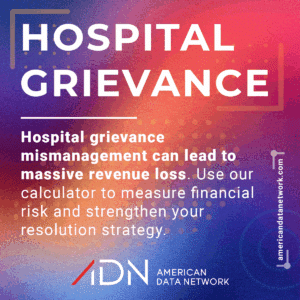Hospital Grievance Risk: Can Your Facility Afford Unresolved Complaints?
Unresolved hospital grievances don’t just risk compliance—they silently erode your bottom line. Use our free calculator to uncover how much revenue your organization could be losing and learn how to take control with a smarter grievance strategy.
⏰ 4 min read
Table of Contents
Effective hospital grievance management is not just a regulatory obligation; it’s a financial imperative. While complaints and grievances are often categorized as patient satisfaction or compliance issues, their true impact runs deeper. Every unresolved grievance represents a potential loss in patient revenue, trust, and future referrals. With the average hospital stay valued at over $18,000, even a small number of unresolved grievances can translate into millions in lost income. This article explores the hidden financial risk of hospital grievances and shows you how to calculate it for your organization.

Hospital Grievances: More Than a Compliance Issue
Unresolved complaints and grievances aren’t just customer service problems; they’re significant financial risks. Every unresolved hospital grievance can contribute to revenue loss, reputational harm, and increased regulatory scrutiny.
Hospitals thrive on trust, transparency, and accountability. Yet, when a patient grievance is overlooked or mismanaged, the consequences go far beyond the individual case. They ripple through your community, affect future patient decisions, and quietly drain your revenue.
The True Cost of an Unresolved Hospital Grievance
Based on 2023 Hospital Cost Report data, the average net patient revenue per adjusted discharge for U.S. acute care and critical access hospitals is approximately $18,426. That’s how much your hospital could lose each time a patient walks away dissatisfied.
Now imagine your hospital fields 100 patient grievances annually, and 30% remain unresolved. That’s 30 lost patients, equating to $552,780 in direct revenue losses. But the impact doesn’t stop there.
On average, dissatisfied patients talk to 9-15 people. If just 10 others choose not to seek care from your facility, that’s another $5,527,800 in lost potential revenue.
Total potential loss: over $6 million. From just 30 unresolved grievances.
Use Our Calculator to Estimate Your Hospital Grievance Risk
To help you quantify this risk, we developed the Hospital Complaints and Grievances Financial Impact Calculator.
This free tool allows you to:
- Input your hospital’s grievance volume
- Adjust your resolution rate
- Estimate how many people each dissatisfied patient influences
With just a few clicks, you’ll get a personalized snapshot of your financial exposure and the potential value of improving your grievance management process.
Why a Structured Hospital Grievance Process Drives Financial Performance
Managing grievances isn’t just about checking a compliance box: it’s about protecting long-term revenue. Hospitals with clear, well-executed grievance processes respond faster, resolve issues more effectively, and retain more patients.
A structured grievance process helps you:
- Address concerns quickly and reduce patient attrition
- Improve transparency and rebuild trust through timely updates
- Ensure accountability by routing issues to the right teams
- Identify recurring service breakdowns that affect satisfaction and revenue
Grievance policies aligned with CMS and accreditor expectations (like The Joint Commission or DNV) don’t just prevent fines, they also reduce the risk of lost revenue due to unmanaged dissatisfaction.
Manual Hospital Grievance Processes Increase Risk
Many hospitals still manage complaints and grievances using spreadsheets, email threads, or paper forms. These outdated systems make it easy for grievances to fall through the cracks, delaying resolutions, missing deadlines, and eroding patient trust.
A dedicated hospital grievance management system, like ADN’s specialized software, helps you:
- Route grievances to the correct department automatically
- Track deadlines to ensure timely follow-up
- Document every step to maintain compliance
- Report on trends to support continuous improvement
Explore our full solution here:
👉 Hospital Complaints and Grievances Software
Protect Revenue with Proactive Hospital Grievance Management
Hospitals that treat grievance management as a strategic priority, not just a regulatory requirement, see improvements in patient satisfaction, retention, and revenue.
Steps to take now:
- Revisit your hospital grievance policy to ensure compliance and clarity
- Train your staff on consistent grievance response workflows
- Track and resolve grievances efficiently using digital tools
- Use our calculator to understand your current financial exposure
Ready to See the Numbers?
Unresolved grievances cost more than you think. Quantify the risk and discover how proactive grievance management can protect your hospital’s bottom line.
→ Try the Hospital Grievance Financial Impact Calculator Now


